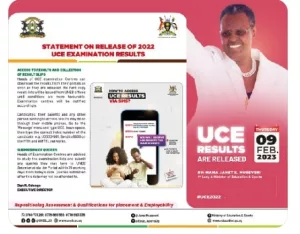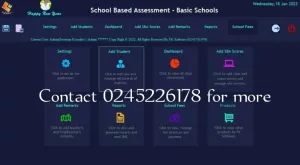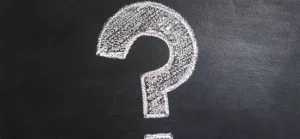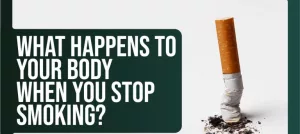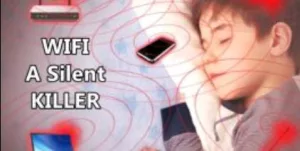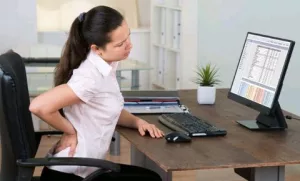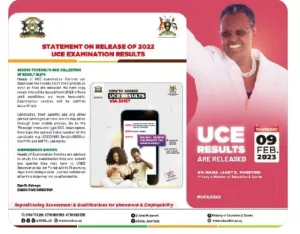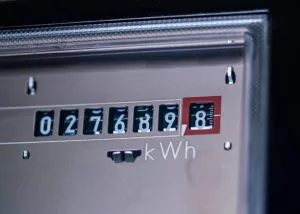UCC JHS BECE Pre-Technical Mock Questions
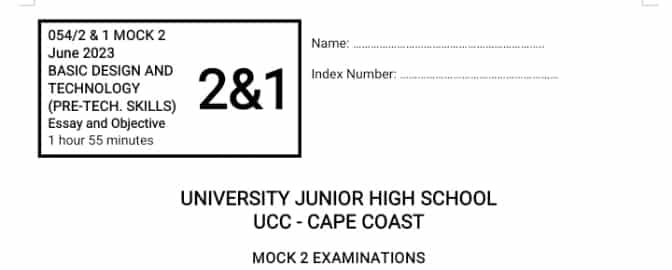
BECE pre-technical mock questions
UCC JHS BECE Pre-Technical Skills Mock Questions
UCC JHS tutors set these BECE Pre-Technical mock questions to test their candidates preparedness for the incoming Basic Education Certificate Examination. These mock questions are the best set of BECE mock questions that any candidate should attempt.
See also: UCC JHS BECE Home Economics Mock Questions
Paper 2: Written
SECTION A CORE SKILLS [COMPULSORY] [20 marks]
BECE Pre-Technical mock questions
1. (a) Define the following;
(i) Stitch
(ii) Seam
(iii) State one characteristic of a good seam.
(iv) State one reason why a dressmaker would use a double stitch for securing stitches instead of tying a knot at the end of the thread. [6 marks]
(b) (i) Name the two types of capital that are considered when setting up a small- scale enterprise. [2 marks]
(ii) Give one reason why you will prefer sole proprietorship to partnership. [2 marks]
(iii) Name the four major operations that are carried out by all enterprises. [2 marks]
(iv) Who controls all the operations mentioned in (iii) [1 mark]
(c) (i) List two materials needed to make a household furniture.
(ii) Name two electrical gadgets
(iii) Name two instruments used to record data during investigation.
(iv) What is termed as corrective maintenance? [7 marks]
SECTION B [50 marks]
BECE Pre-Technical mock questions: Answer two questions only from this section. All questions carry equal marks.
2. (a) A brick wall of six blocks in length and five courses high is to be constructed at the school’s practical shop.
(i) Re-arrange the following procedure for setting-out the given wall in their correct order
Complete the outline of the wall
Square line at one end of the wall
Draw the face line of the wall
Measure for the length and thickness of the wall.
(ii) List four basic tools required to set-out the wall.
(b) Calculate for:
(i) The length of the wall,
(ii) The height of the wall.
(using brick sizes 215 mm x 102.5 mm x 65 mm and mortar joint 10 mm thick)
(c) (i) Make a freehand pictorial sketch of try square.
(ii) Label any two parts of the try square in question 2 (c)(i) above.
(iii) State one use of the try square in wood workshop. [25 marks]
BECE Pre-Technical mock questions
3. (a) Copy and complete the table below.

(b) (i) State two differences between thermoplastics and thermosetting plastics.
(ii) Give two examples each of thermoplastics and thermosetting plastics.
(iii) State two reasons for maintaining and handling tools with care.
(c) (i) Make a freehand pictorial sketch of a tenon saw.
(ii) Label any two parts of the tenon saw sketched in question 4(c)(i)
(iii) Differentiate between plastering and rendering. [25 marks]
BECE Pre-Technical mock questions
4. (a) (i) Make a freehand pictorial sketch of a hand trowel.
(ii) Indicate and label any two parts of the hand trowel sketched in question 3(a)(i).
(iii) State one use of the hand trowel.
(iv) State one method of maintaining the hacksaw.
(b) The figure below shows the isometric view of a wooden block.
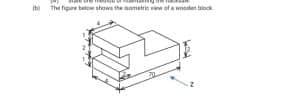
Draw to full size in first angle projection:
(i) the front elevation in the direction of arrow Z.
(ii) the plan
(iii) State the most suitable finish that can be applied on the work.
(c) (i) State two causes of accident in the workshop.
(ii) State two methods of sawing wood.
(iii) Give two reasons for seasoning timber.
(iv) Mention two types of adhesive materials used to bond wood to other material surfaces.
Paper 1: Objectives
BECE Pre-Technical mock questions: Now answer the following questions.
1. A business unit, that is established to render services and produce goods for customers and the general public is a/an
A. company
B. corporation
C. enterprise
D. organizations
2. The distribution of raw materials and manufactured products is usually done by;
A. businessmen
B. enterprises
C. small-scale enterprises
D. retailers
3. What is the main purpose of three Sole Proprietors who have come together to run a single business entity?
A. Employ more people
B. Expand the business
C. Share ideas
D. Share profit
4. Under which step of the management process is the leadership style of a company adopted?
A. Directing
B. Controlling
C. Organizing
D. Planning
5. In business, the possibility of being exposed to danger or loss from a known source is referred to as;
A. business risk
B. direct risk
C. indirect risk
D. known risk
BECE Pre-Technical mock questions
6. In designing, which of the following is not considered for specification?
A. construction
B. Design brief
C. Economics
D. Materials
7. Which of the following is not a household furniture?
A. Wardrobe
B. Television
C. Shoe rack
D. Cupboard
8. To access the worth of design product is termed as
A. Analysis
B. Evaluation
C. Making
D. Specification
9. Which of the following is used to insulate electrical wires?
A. wood
B. plastic
C. metal
D. cement
10. Which of the figures below is a prism?
A. cone
B. cube
C. sphere
D. square
BECE Pre-Technical mock questions
11. Which of the following sets are temporary stitches?
A. basting and tailor’s tacking
B. chain stitches and tacking
C. hemming and basting
D. uneven tacking and running stitches
12. Which of the following can be used to neaten the raw edges of an apron?
A. back stitch
B. hemming stitch
C. herringbone stitch
D. loop stitch
13. Which of the following is not a function of permanent stitches?
A. decorating articles
B. joining seams
C. marking designs
D. neatening raw edges
14. When working temporary stitches, colour of thread must be
A. black colour
B. contrasting colour from fabric
C. same colour as fabric
D. white colour
15. A thimble is worn on the ………
A. index finger
B. middle finger
C. ring finger
D. thumb
BECE Pre-Technical mock questions
16. What is the reason for using joints in sheet metal products?
A. to make it stable
B. to make it strong
C. to prevent crumpling
D. to prevent leakage
17. Plastics are obtained from
A. Clay
B. Crude oil
C. Limestone
D. Quicklime
18. The development of a cylindrical cup without
a handle is a
A. parallelogram
B. Rectangle
C. Rhombus
D. Triangle
19. The sketch below shows a . . . . .
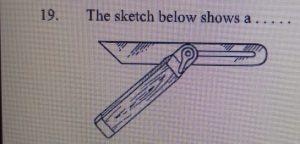
A. cutting edge
B. marking knife
C. sliding bevel
D. try square
20. In orthographic projection, the front and the end elevations are aligned
A. diagonally
B. Horizontally
C. Perpendicularly
D. Vertically
BECE Pre-Technical mock questions
21. An example of a ferrous metal is
A. Tin
B. Copper
C. Cast iron
D. Aluminium
22. Which of the following is not a fastener?
A. Bolt and nuts
B. Rivet
C. Screws
D. Soldering bit
23. Which of the following is used to protect against handing of dangerous chemicals
A. Helmet
B. Goggles
C. Gloves
D. Apron
24. Which of the following tools is used for batching?
A. Gauge box
B. Gauge rod
C. Spirit level
D. Wooden float
Use the sketch below to answer questions 25 – 27.
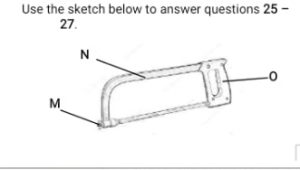
25. The tool shown above is
A. Chain saw
B. Hacksaw
C. Rip saw
D. Tenon saw
BECE Pre-Technical mock questions
26. The part labelled N is the
A. Wing nut
B. Teeth
C. Handle
D. Frame
27. The part arrowed O is called
A. Blade
B. Handle
C. Holding pin
D. Wing nut
28. The sketch below shows
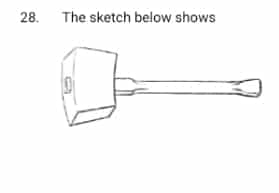 O
O
A. Ball pain hammer
B. Flat chisel
C. Try square
D. Wooden mallet
29. Files are named according to the
A. metal used to produce them
B. shape of cross-section
C. trye of cut
D. type of work they do
30. Cast iron posses the following qualities, except
A. cannot be bent without breaking
B. cannot be forged to shape
C. low carbon content
D. shocks and wear
Post Disclaimer
The information contained in this post is for general information purposes only. The information is provided by Educative News and while we endeavour to keep the information up to date and correct, we make no representations or warranties of any kind, express or implied, about the completeness, accuracy, reliability, suitability or availability with respect to the website or the information, products, services, or related graphics contained on the post for any purpose.

